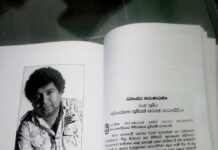The award winning novel, Appachchi Avith, which was written by Saman Wickramarachchi, can be considered as a successful expression of the psychosocial aspect of the present society. Around the world, there are many writers who use the psychological knowledge as a way of creating a newest thing. More than that doing an artwork with a greater sense of humanity and a broader sociocultural understanding is a bigger challenge to a writer. When it comes to the recent achievements of Sinhalese literature, Saman Wickramarachchi faces the challenge in an efficacious manner.
As an Artwork
The novel is very much appreciative as an artwork, because the structure of the novel that Saman Wickramarachchi uses here is somewhat different from the traditional story telling method. And when it comes to the narrative arrangement, his usage of characters, language, the mental statuses that has ascribed to the characters are pretty much interesting and provide a newest experience to the reader. The writer’s usage of the language regarding each character has proceeded with a real understanding of the character. For an instance the way how Nissanka talks is totally different from the way how his delusional character, appachchi talks. When it comes to Appchchi, his way of talking, the way he express feelings, the political viewpoint, the workplace environment, all these are arranged in a well arranged and a constructive way. Saman Wickramarachchi uses the first person’s viewpoint in order to make the reader to experience the novel to the fullest. The successfulness of the dialogues and the conversation that Nissanka is having with his mentality emphasizes the writer’s capability of the continuation of the novel. One can say that this novel is written on surrealistic base. But the specialty of the writer is that even the plot is in a surrealistic base, his ability to present it using a realistic base. It is meritorious that the writer is capable of presenting the narration within a realistic foundation rather than leaving it to the surrealistic genre.
The flow of the narration is based on the main character, Nissanka Senadheera, who is working as an executive officer to a government office. Simply the novel goes on a delusional experience of a person that he thinks as a real, who has caught up with schizophrenia. The other characters like Sumali (wife), Sumudu (daughter), Hilda (woman in the neighborhood), Samaradivakara (head officer of the Nissanka’s workplace) etc. have been used for the continuation of the story to the end. And the most influential character that Saman Wickramarachchi introduces here is the character of ‘Appachchi’, whom Nissanka has the greatest influence. In terms of the whole apologue, the writer certainly tries to explicate the current sociopolitical situation, and to give an idea of touching the present moment, because it is an immediate need in the present circumstances, to the fullest as much as the reader can.
With Regard to Divers Viewpoints in Psychology
As mentioned before, ‘Appachchi’, the delusional character has been introduced as the outcome of Nissanka’s suppressed thoughts. Which means the novel is ongoing with the psychoanalytic teachings of the Psychoanalytic school of psychology. According to Sigmund Freud (1856-1939), he has explained the mind under three parts, with relevance to his ice burg theory; as conscious mind, unconscious mind and Subconscious mind. Conscious mind is where you are aware of the surrounding; Subconscious mind comprises the thoughts, feelings, wishes, memories that can be easily reminded. When it comes to the unconscious mind it has the banished, unacceptable thoughts, passions in childhood experiences that couldn’t satisfied. Considering the situation of Nissanka, it is the unconscious mind that is working within him. As a result of these uncontrollable thoughts and feelings, a delusional character appears as the father. Also it can say that father and Nissanka are both just two sides of the same person.
Subsequently, Freud also distinguished the structure of the personality under three other concepts as Id, Ego and Super Ego. Id comprises three aspects mainly; the instincts, suppressed thoughts of childhood and the suppressed thoughts and memories of the adulthood. Ego works with a realistic principle, that means Ego seeks to gratify the Id in a realistic way. And the super ego functions as the moral principle of the person. That means the voice of consciousness that focuses on how we ought to behave. It seems that Nissanka is facing a kind of a moral anxiety, which means a person would face moral anxiety when he does something against the Super Ego. Within the narrative, Nissanka always suffer due to his behavior towards father and also towards his wife Sumali. On the other hand there are situations where he functions as submissive to the Id. For an instance the blue video scene and the discussion with the psychiatrist can be elaborated here.
Next, as the lawyer explains to the judge, there is a problem regarding the Oedipus complex of Nissanka’s childhood. Freud explains this with relevance to his psychosexual stages of development. There are 05 stages as psychosexual stages of development. What Freud emphasizes here is that if a person did not satisfied any of his needs when he is passing each of the stages the outcome of the dissatisfactions would be a problem in his upcoming future. The Phallic stage of these five stages is where the child gets a sexual feeling towards the parent of the opposite sex. In terms of Oedipus complex it happens to the male children, helps the child to build a successful identification of the same sex parent. But with regard to the Nissanka’s situation it seems that this has not happened due to childhood problems. Nissanka couldn’t get away from the personality of the father. Therefore father stayed inside his mindset and started disrupting his personal life. It is delusional when it comes to the mentality of a schizophrenic personal; they usually get the false, erroneous beliefs about the surrounding, hallucinations etc. Nissanka faced the same thing. This mental health problem affected his behavioral and environmental, social functioning as well.
Regarding Jacques Lacan’s (1901-1981) concept of the ‘Name of the father’ (Lacan do accepts Freud’s basic idea of Oedipus complex), he suggests that the force which drives us as ‘desire’. This desire also is known as ‘the symbolic order’. The symbolic order forms when we exchange objects for words and when we lose their real presence. This concept of desire is being directed at many objects during a person’s life, it can be ‘mother’, the starting point of the symbolic order and the ‘father’ who is the central figure of this process. When it comes to the later life of the person, the role of symbolic order would be assumed by diverse ways of authority and social institutions. Nissanka’s problem here is that he is unable to define his father. Which means in the process of forming symbolic order, Nissanka was not good at changing his perception towards Appachchi. More than that, this ‘symbolic order’ can be correlated with the present institutional formation. It is observable that lacking of the supervision of the head figure of an institution would impact on the subordinates negatively. If the subordinates lose the identification of their supervisor, the effectiveness of that particular institution would be decreased.
The text has relevance with the Humanistic viewpoint itself. According to Carl Rogers (1902-1987) there are three major dimensions when it comes to describing the human; the total individual, phenomenal field (all the experiences of the person that gained through the whole life) and self-concept. According to Rogers, the imbalance of the self-concept and the phenomenal field would make total individual to collapse. The problem regarding Nissanka is that, he is not capable of re-building his balance of life while justifying the self-concept. The self-concept is how the person sees himself. Nissanka’s breakdown of the self has led him to lose his balance. Most of the time the problem of the present society is people lose the self, the balance of their lives.
With the understanding of the existential philosophy (Existentialism), every person lives between three worlds as biological world, interpersonal world and the spiritual world. If the person broke the connection between these three worlds, he might get problems. Existentialists emphasize the importance of being rather than non-being. Being is the survival; people would do anything for the survival. When the people damage the connection of these three worlds there might be problems like depression, detachments and depersonalization etc. The depersonalization is where many people lives within the same person. Nissanka faces the same thing. His father lives within himself. Seems it is a delusional fantasy, but the impact is totally negative towards the personal.
In terms of Nissanka’s problem, it can say that to some extent Nissanka did not have the ability of speaking for himself. Which means he had an idea of what actually he is? That is similar to those who came from a hard background and from a painful earlier life, Nissanka have had the same feeling of his real past. When he started to get adapted to the present life style, all he wanted was to let the past go and just to get involved with the present scenario. Likewise, he forgot his appachchi. And finally he was distressed and he wanted to go back to his earlier life, and then suddenly his appchchi appears in his door step. It seems that Nissanka did not have a way of conveying his thoughts. They were just pushed down to his unconscious mind.
With a Socio-cultural and Political Base
As mentioned, this text has aligned with the sociocultural, political structure within Sri Lanka. Let’s take the institutional formation of a government office; it is controversial to say whether they do the exact service that they were expected to do. It can be seen that the whole format has been collapsed. It is easy to say that the parliament complex has been wear away, but is that really the buildings that are being crumbled? What about the dying humanity within the people who works their? Let’s take the structure of a university. Is it possible to say that the ultimate product of the university has become what they expected? It doesn’t matter whether it is a service or a product. The only thing that matters is the humanness, and being alive as a human. Is it possible a country to move forward with an ailing mind? Therefore one can say that Saman Wickramarachchi’s attempt here is to evaluate the present complexity of the society in an insightful mind.
Relating to the composition of the narration, “appachchi avith” is a mixture of the huge sociocultural crisis. It is not only regarding the sociocultural context, but the politics, economy, the life of people etc. The writer tries to evaluate the present scenario of the country to a certain extent, in terms of the complex life style that people have. The reader has to gain it through the reading of the novel. Moreover, the writer attempts to provide his understanding of the human nature in a more comparative way, the best thing is so that the reader can separately understand it by themselves. Since we are stuck into the dream of development, how the people have lost the moral value of the life? How do people would cope with the daily life? How often they would solve their problems rather than making a conflict between others and themselves? This is what the writer wants to express in the story; i.e. how does a single individual can face his own conflict without ruining it and damaging the constructiveness that already that person has had for years? This is what the present discussion should be.
The behavior of Nissanka within that social status seems to be artificially linked to his life. That is that how the workplace environment has affected on Nissanka’s real life. It can see that Nissanka is not an ordinary person or an ordinary mind. The ordinary mentality has been suppressed up to a certain level so that he had made up his own mentality towards a delusional fantasy. Of course Nissanka is very passionate about what he is doing, but what about when he comes to his social and interpersonal relationships? The relationship he has with his wife or daughter? May be the relationship he has with the neighborhood? How he deals with his chief? His imaginations of how his chief officer thinks about him? The relationships seem to be more de-constructive. Even he doesn’t want to be so polite; the society has given the measure of being polite at least to be a man of the honor. But when it comes to his actual inwardness he is so wild, in the real sense. This is the actual situation among all who are at least in believe of that they are developing. They only focus the material development rather the moral values, norms and the mental health. The importance of the sustainable development also can be elaborated here. A need of discussing the mentality, frustration, tension, stress of the present employee arrives here, that means there is a lot more to do with the mentality beyond the present material society.
Saman Wickramarachchi tries to bring the narrative and the cinema together in order to give a broader idea regarding his subjective matter. He takes the movie ‘A Beautiful Mind’ (2001), which was directed by Ron Howard and won the Academy Award for the best picture, which is also based on a professor who faced the same thing as Nissanka. This Professor known as John Nash also has delusional characters around him as Parcher, Charles and little Marcee and the end of the story he get used to the way of managing his delusions. John Nash had the same problem as Nissanka, the problem of dealing with people. ‘A Beautiful Mind’ also has explicated the day to day problems, social acceptance, family, relationships, the mentality, and the total structural orientation that happened as a help to the main character of the movie. The problem regarding schizophrenia is that patient seeing abnormal things as the normal brain see’s things. Therefore compliant to John Nash, it can say, the hallucinations are similar to dreams and nightmares, the only thing that these dreams and nightmares want us to do is, keep feeding them, so that they can keep alive!
K.V.P.Miurangani Karunaratne
Jayawardhanapura University
For Study -Difference Between Psychology and Psychoanalysis





















Good job Miurangani. I really appropriate your attempt. Carry on.
Comments are closed.